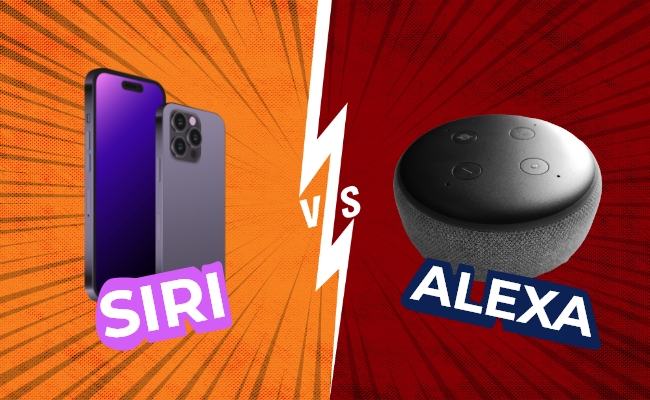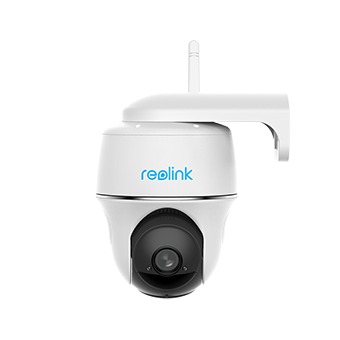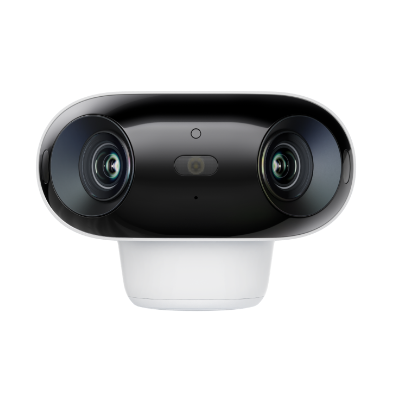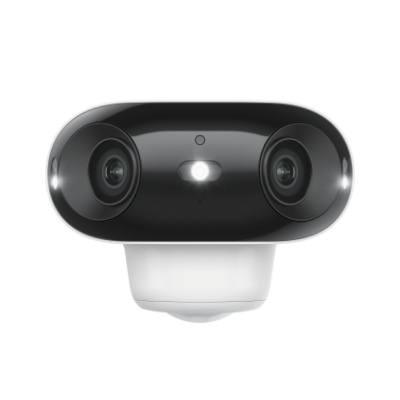Siri vs Alexa: What's the Difference?

As technology advances, the appliances and electronic devices around us are getting smarter. Today, with AI voice assistants, it has become possible to control electronics from anywhere in the home. However, the problem now is that there are different voice assistants, which makes people ask questions like "What is the best assistant, Google, Siri, or Alexa?” That’s why we are here to compare Siri vs. Alexa. This comparison will help you choose which one is better for you.
Siri vs Alexa: What is Siri?
Let us start this Siri vs Alexa comparison with a basic overview of both voice assistants. Starting with Siri, it is Apple's virtual assistant that is integrated into most Apple devices including iPhone, iPad, Apple Watch, Apple TV & Home, AirPods, Apple Vision and Mac. Siri allows effortless voice command interface in all these devices.
Siri was introduced back in 2011 and it uses voice queries with a natural language user interface to perform its actions.
Its actions include answering questions, making recommendations, or performing specific actions according to the user’s request. It is based on AI and ML; hence, it learns and adapts to users’ language usage, making it efficient in searches and actions with that user.
Some key functionalities that Siri is used for include:
- Sending messages or making calls
- Handling device settings
- Internet searches
- Setting reminders, etc.
Siri vs Alexa: What is Alexa?
Unlike Siri which is integrated into the device, Alexa is a cloud-based virtual assistant. It was developed by Amazon and launched in 2014. Alexa is used in Echo and Echo Dot by Amazon which are smart speakers.
Alexa can be used for setting alarms, making lists, playing music, audiobooks, and podcasts, and providing news and weather updates in real-time. Apart from that, Alexa can be used to control multiple smart-home devices present in your home, making it a complete home automation system.
In addition to using, it for controlling smart home gadgets, users can also use it for voice-controlled online shopping.
Siri vs Alexa: How Do They Work?
The working methodology for both these virtual assistants is very similar. Each one listens to the wake word to start listening to the user’s query. Then they record the voice input made by the user and upload that clip to their cloud servers for real-time processing.
Both virtual assistants use advanced NLP algorithms to understand what the user is saying and how to respond to those queries. After this processing happens in the cloud, a response is generated and sent back to the device which speaks the response loudly through its speakers.
Both Siri and Alexa are based on AI, ML, and NLP technologies, and their backends are continuously improved through frequent updates over the cloud.
What’s the Difference between Alexa and Siri?
When you learn about Siri and Alexa, you will come across multiple similarities and overlapping features in the two. It may make you wonder what the difference is between Alexa and Siri. So, in this section, we will explain all the differences between these two voice assistants.
Platform and OS
The first difference is the operating system and platform for these virtual assistants. Siri is designed to operate in the Apple ecosystem, which comprises iOS, WatchOS, MacOS, and TvOS devices. This OS integration allows users to use Siri with a similar experience on different devices. Meanwhile, Amazon Alexa is found in Echo devices and provides integration with third-party smart devices.
Compatibility
Device compatibility is the next major difference. In this case, Siri is only compatible with Apple's devices. This means that if you have a device outside the Apple ecosystem, you cannot use Siri on it. Alexa, on the other hand, offers broader compatibility. It supports communicating with devices from various third-party devices without any problems.
For instance, compared to Siri, the Alexa ecosystem is compatible with a wider range of smart home devices, including security cameras. Alexa is compatible with a wide range of cameras, including the Reolink Argus PT. This pan and tilt security camera offers impressive 2K+ 5MP resolution and features color night vision for 24/7 surveillance. You can easily connect it to your Alexa home hub for convenient hands-free control and monitoring.
100% Wire-Free PT Camera
2K+ 5MP Super HD; 5GHz/2.4GHz WiFi; Rechargeable Battery & Solar Powered; 355° Pan & 140° Tilt; IP65 Certified Weatherproof; Color Night Vision; 2-Way Audio; 122° Wide Viewing Angle.
When it comes to cameras, the only platform that rivals Alexa is Google Assistant. Reolink has newly launched its dual-lens security cameras, the Argus 4 Pro and Argus 4, which can also be integrated with Home Assistant. Users can enjoy 180° blindspot-free view and smooth 4K streaming on their Google tablets.
4k 180° Wire-free Color Night Vision Camera
4K UHD 180° Blindspot-free View; Color Vision Day and Night; 30% More Battery Life; Dual-band Wi-Fi 6; Smart detection.
Alternatively, if you have a limited budget, you can consider the Argus 4, which also works with Google Assitant.
4k 180° Blindspot-free Wi-Fi 6 Camera
4K UHD 180° Blindspot-free View; Dual-band Wi-Fi 6; Smart detection; Easy Installation Anywhere
Multi-user support
Muti-user support on the base level is present in both devices but the usage experience is significantly different. This is because Siri can distinguish between the voices of different users when used on HomePod but it does not provide extensive personalization options.
Alexa, on the other hand, remembers user voices and creates their individual preferences. This makes Alexa efficient for personalized shopping, music preferences, calendar entries, etc.
Shopping
Many users use Alexa for shopping, and the backing from Amazon makes Alexa much better in this part of the comparison. Users can not only shop but also track their orders and get exclusive deals through Alexa voice commands.
Siri does allow users to shop online using their voice and supports Apple Pay transactions, but everything is based on a general web search here.
Sound quality
Sound quality is more of a hardware-based feature than a software feature. In this department, HomePod brings a better experience for everyone, including music enthusiasts, due to rich and balanced audio.
In this case, Alexa is not known for the best sound quality unless you get a higher-end model or integrate Alexa with your wireless speakers.
Language support
Apple has a global market reach and that allows Siri to support multiple languages including dialects. It makes Siri an exceptional option for non-English-speaking countries. In this case, Alexa is still under improvement, and it offers fewer languages than Siri, making Siri the better option for international users.
Who is better? Alexa or Siri?
Here are a few key factors that you must consider deciding which option is better for you.
What ecosystem have you invested in?
Using Siri will only be a good experience if you have already invested in Apple’s ecosystem. If you use android and other operating systems, then Alexa will be a better option for you.
Do you prefer wide compatibility or simplicity?
Alexa is known for its wide compatibility, while Siri is known to keep things simple. So, if you want compatibility with a large list of devices, go with Alexa. Similarly, if you want a straightforward experience along with wide compatibility, then Siri is the right one.
Do you plan to use this device to listen to music?
Lastly, if you are a music lover then Siri with Apple HomePod will be the better option. It is because of the better speakers and Apple Music support, none of which is available in Alexa.
FAQs
1. Is Siri better than Alexa?
You can only decide if Siri is better than Alexa or not by checking your usage requirements. If you have invested in the Apple ecosystem and want privacy and integration with those devices, then Siri might be the better option. Otherwise, Alexa will be your best pick if you want a better smart home automation experience.
2. Who is smarter Alexa or Siri?
Alexa and Siri both are smart, and they outrun each other when they are used in their right use case. For instance, there is nothing better than Siri when it comes to providing a device-synced experience within Apple devices. At the same time, Alexa will be smarter when you want third-party integrations.
3. Siri vs Alexa vs Google: What’s the difference?
The main difference is in their functionality. For example, the main functionality of Alexa is that it integrates well with smart home appliances. Similarly, Siri is Apple's assistant, and it integrates well within its ecosystem. Meanwhile, Google Assistant is good for Android devices, and it can pull information from the web or handle complex queries.
4. Which voice assistant is the best?
Every voice assistant is designed with certain usage requirements in mind, and it is best when used according to its desired use case. So, if you correctly choose your voice assistant according to the required compatibility and functionality, that voice assistant will be the best for you.
Conclusion
The Siri vs. Alexa comparison can be confusing since both voice assistants have many similar features. We hope that this comparison has helped you select one of the two. However, if you are still confused, you need to list your use case and preferences.
Checking your OS environment, preferences, usage, compatibility, and personal preferences will help you choose one between the two.
Search
Be in the Know
Security insights & offers right into your inbox



